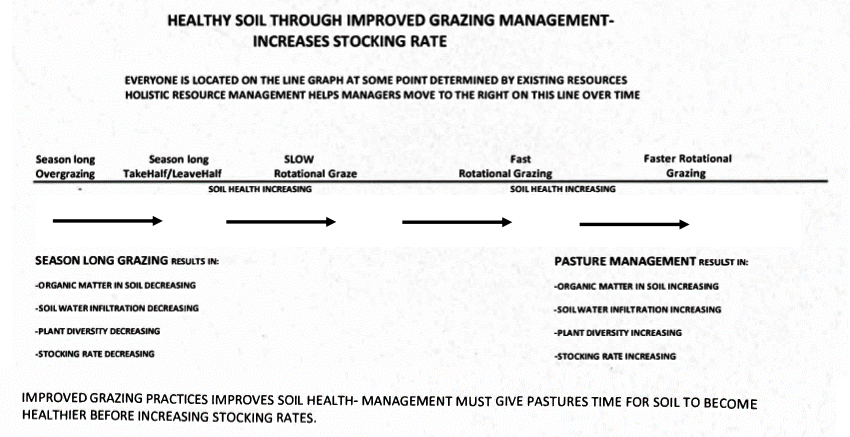Join our Mailing list!
Get all latest news & be the first to know about upcoming events.
It turns out that in order to thrive, everything needs rest and recovery. The Grassland Coalition believes that proper range management makes it possible to nurture the land and the environment and maximize the economic opportunities created by healthy grasslands. This year’s focus during our three grazing schools was a better understanding of the relationship between the different types of grazing plans and the opportunity for the rest and recovery that grasslands need to thrive.
The graph shows the relationship between soil health and different levels of management. As you read the line graph from left to right, think about REST and RECOVERY for each management style. REST being measured on a calendar and RECOVERY being measured by growing days with adequate moisture.

Livestock left in a pasture with adequate forage for 3 to 6 months will select for the most palatable plants every day. Often these are plants that were previously grazed and have begun to regrow. The regrowth is palatable to the cow but if re-bit, it is detrimental to the grass plant. This plant begins to lose its competitive edge with the plants around it. Many of these palatable plants will eventually go away under this management. If half of the standing forage is left at the end of the grazing season, many plants will still have been severely overgrazed and damaged during the summer.
The pasture grazed for 6 months in the summer will have 6 months rest during the winter. Season long grazing during the summer, from a plants point of view, has very few growing days to rebuild energy to grow again next year. Plants go into dormancy during winter months, those plants continuously grazed all summer will not adequately recover in the winter and spring. Many of the most nutritious plants will be weakened.
The livestock are moved every 4 to 8 weeks under this management style. Grazed plants will begin to regrow in approximately 7 to 10 days. This management style allows the livestock to re-graze plants after regrowth. These plants will have to shut down growth in order to rebuild roots. Their competitiveness will be somewhat decreased. However, this will be an improvement over season long grazing especially if the pastures are grazed at different times in future years.
The plants could have 10 months’ rest with 120 or more growing days to rebuild.
The livestock are moved every 2-4 weeks. Some grazed plants will be re-bit, the regrowth would be minimal so damage is slight. Old plant matter is allowed to build up on the ground. This will protect the soil from heat and holds moisture in the soil. Plants that were “grazed out” in season long management will begin to return.
The plants have no livestock grazing for 50 weeks’ with almost a full growing season to recover.
The livestock are in the pasture for one to ten days.
The plants are rested 355 to 364 days’. The plants have 170 to 190 days to regrow. The pastures will be small. Soil amour “litter” will be protecting the ground from heat and preserving soil moisture. Livestock will graze plants they normally avoid in season long management. The result is even utilization. The number of grass plants per square foot will be increasing. Plants that were “grazed out” during season long management will start showing up in large numbers.
Pastures need livestock grazing to maintain plant health. By managing the recovery of these plants through rotational grazing, soil and plant health improves leading eventually to higher stocking rates. Each ranch has unique resources. By applying adaptive management learned at the grazing school a grazing plan can be developed to improve pasture health. Upon graduation participants are eligible for the Grazing School Follow-Up Program. A consultant will come to your ranch to help you implement grazing practices learned at the Grazing School. Creating drought resilient pastures can be done through managed grazing practices.
These practices are taught at the grazing schools in the Wall, Chamberlain and Watertown area every June, August, and September. Sign up early as the schools fill up fast. To register call Judge Jessop at 605 280-0127.
Get all latest news & be the first to know about upcoming events.